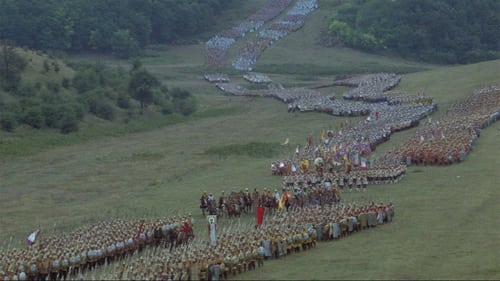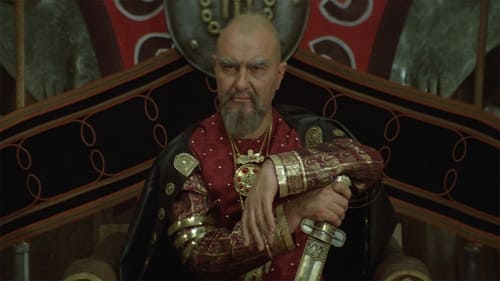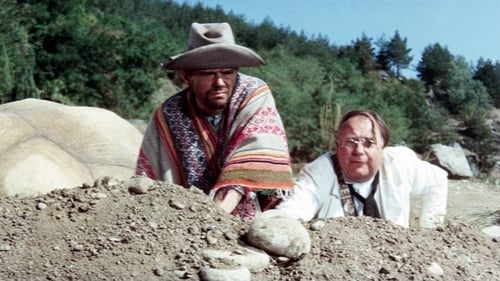Bogomil Simeonov
출생 : 1922-09-27, Radomir, Bulgaria
사망 : 1991-08-15

Ismail bey
In the 17th century, a Bulgarian Christian region is selected by the Ottoman rulers to serve as an example of conversion to Islam. A Janissary who was kidnapped from the village as a boy is sent to force the reluctant inhabitants to convert. The Turkish governor seeks a peaceful solution, but ultimately torture, violence, and rebellion break out.

The last part of the epic "Khan Asparukh" - "Land Forever" is an impressive finish to scale narrative, created for the nationwide celebration of 13 century anniversary of the Bulgarian state. The authors collected in final chord all storylines, culminating in the political strengthening of the young Bulgarian state. In the center of the film epic again is the image of Khan Asparukh - a lofty romantic hero who embodies the virtues and energy of his people.

This is an epic screen presentation showing the creation, the consolidation and the power of First Bulgarian Kingdom and the first Bulgarian ruler Khan Asparuh. The second part of the great historical epic - "The Migration" - tells about the long journey to the land of the Bulgarians of today's Bulgaria. Here the young Khan Asparukh laid the foundations of the new state. The authors adhere to the established historical versions for this event. The film builds on the impressive mass scenes and the convincing served psychological characteristics of the main characters. The image of Asparoukh is a natural center of the story, in which many minor persons recreate the environment of the Khan. Romantic exalted, Asparukh is shown as capable leader of the people, consistently implement his own ideas.

This is an epic screen presentation showing the creation, the consolidation and the power of First Bulgarian Kingdom and the first Bulgarian ruler Khan Asparuh. This is the first part of the film trilogy about the events before the creation of the Bulgarian state in the middle of the VII century. Volga Bulgaria is straining under the attacks of the Khazars. Following the testament of his father, the sons of Khan Kubrat looking for a new home for their tribes. The youngest of them - Asparukh, wander 20 years in search of "land forever" for his people and reaches the mouth of the Danube. The film is narrated by captured Byzantine chronicler Belisarius, which should Asparukh in his journeys. Byzantine witnessed the heroic efforts of the Bulgarians to win the land south of the Danube and to create their new country.

Kral Andrey
The film takes us back into the times of the Second Bulgarian Kingdom - 13th century. The Bulgarian Emperor - Tsar Ioan Assen - is trying through several marriages to enlarge the State and to support the peace in it.

Colonel Angelov
In 1944 Bulgaria switches sides and joins the war against Germany. The story focuses on the advance of the Bulgarian army through Yugoslavia and Hungary, as well as its internal struggles.

Professor Dimov is a diplomat who has been recruited as a spy by a foreign intelligence service. The suspicions fall on Dr. Belcheva. Major Kalinov is entrusted with the investigation of the case. He learns that she is Dimov's mistress. Paris, France. Dimov and Belcheva go out leaving a bag with secret documents in Belcheva's hotel room. Kalinov manages to retrieve the documents. After this incident Belcheva dies in hospital from poisoning. On board the plane Kalinov exposes the professor as a spy. Bulgarian counterintelligence officers arrest him.

Chalaka
Mityo Ganev is a leader of the armed bandits. The authorities accuse the Communists of his robberies. The detachment commander, Chalaka, and Mityo Ganev have a meeting but fail to reach an agreement. The police burn out Mityo's house and send his mother into internal exile. Chalaka cuts him off from his logistical support base. Mityo agrees to join the partisan detachment. Mityo and Velyo hold up the paymaster of the army garrison. When they take the money, Mityo wants to give it to the family of the exiles. Enraged, Velyo hands the detachment over to the Colonel. Mityo kills the traitor. The police and he army launch a major operation against the partisans. In a fierce battle, Chalaka leads the detachment out of encirclement while Mityo covers their retreat. A bullet hits him.

Grosso
During the 1800s, Peru's government sends 2 envoys to negotiate peace with the rebellious Incas but a treasure-hunter bandit shoots the Inca ruler and his son, leaving the 2 envoys to take the blame for it.

Ivaylo
Bulgaria. 13th century. The people, driven to utter despair, rise in arms. They elect Ivaylo - a poor peasant but gifted military commander - as their leader. Ivaylo's army overruns the Tatar invaders and the royal troops. In a decisive battle with the royal army, Ivaylo defeats and slays King Konstantin Asen. To prevent a betrayal on the feudal nobles, who intend to open the gates of the royal capital to Byzantine army, Ivaylo sacrifices his personal happiness, abandons his sweetheart and agrees to marry the widowed queen.

Fomicha
The action takes place in a summer camp. The children are obsessed with the idea of building a ship.

Milat
1197. King Kaloyan ascends the throne in hard times for Bulgaria. The country is still recovering from a century of Byzantine subjugation. He is forced to carry out a very flexible foreign policy in order to strength his positions. Pope Innocent III recognizes him as Emperor (Tsar), but a little later the fourth Crusade crosses the country under Emperor Baldwin. A new conflict is coming. Tsar Kaloyan wages the decisive battle at Adrianople and wins.

Partisans hijack a boat

Alexander
A diver gets trapped at sea and needs to be rescued by the man whose love and life he has ruined.

Enyo
A Bulgarian village before the First World War. The young and ambitious farmer Enyo loves the beautiful but poor Tsveta. His brother and his wife arrange their engagement. The hunchback girl Stanka, daughter of the richest man in the village, is in love with Enyo. Because of her father's lands Enyo decides to end his engagement with Tsveta and starts building up his farm.

Zhelyo
The fortunes of a group of partisans after the triumph of the socialist revolution.













